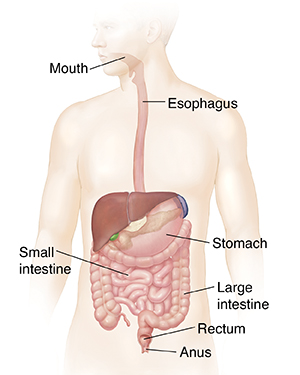What is Irritable Bowel Syndrome (IBS)?
What is Irritable Bowel Syndrome (IBS)?

IBS—a motility problem
The muscle movement that passes food through the digestive tract is called motility. When you have IBS, the normal motility of the digestive tract (especially the colon) is disrupted. Motility may speed up, slow down, or become irregular. If stool passes too quickly through the colon, not enough water is absorbed from it. Loose, watery stools (diarrhea) can result. If stool passes through the colon too slowly, too much water is absorbed and the stool becomes hard and dry (constipation). Also, stool and gas may back up and cause painful pressure and cramping. There is no single test that can diagnose IBS. It is a group of symptoms that help your healthcare provider with the diagnosis. Often multiple blood, stool, radiologic tests, or even colonoscopy are performed in the evaluation of people suspected to have IBS. These are done primarily to make sure that there are no other illnesses that can account for your symptoms.
What causes IBS?
A great deal of research has been done on IBS, but the cause is still not known. Some of the possible factors include:
Smoking, eating certain foods, or drinking alcohol or caffeinated drinks can cause, or "trigger," symptoms of IBS.
Although no one knows for sure, IBS may be caused by a problem with the nerves or muscles in your digestive tract.
There is also some evidence that certain bacteria found after a severe gastroinstestinal infection in the small intestine and colon may cause IBS.
While stress and anxiety worsen the symptoms of IBS, it is not believed to be the cause.
What you can do
Recommendations include:
Certain medicines may help regulate the working of your digestive tract. Your healthcare provider may prescribe one or more for you.
Medicine can’t cure IBS, but it may help manage the symptoms.
Because some medicines may make IBS worse, don’t take any medicine, especially laxatives, unless your healthcare provider prescribes it for you.
Your healthcare provider may suggest some lifestyle changes to help control your IBS. Two of the most important are changing your diet and managing stress. If diet changes are suggested, ask for nutritional guidance from a dietitian so you maintain a healthy nutritional balance in your food intake.
Updated:
March 21, 2017
Sources:
Clinical manifestations and diagnosis of irritable bowel syndrome in adults. UpToDate, Gastroentestinal microbiota in IBS: present state and perspectives. Salonen. Microbiology. 2010;156:3205–15., Patient information: Irritable bowel syndrome (Beyond the Basics). UpToDate
Reviewed By:
Adler, Liora C., MD,Fraser, Marianne, MSN, RN,Image reviewed by StayWell medical illustration team.